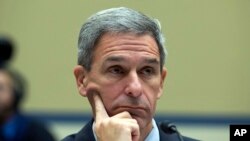A U.S. federal judge ruled Sunday that Ken Cuccinelli was unlawfully selected as acting director of U.S. Citizen and Immigration Services, and because of that he lacked the authority to issue a directive limiting the amount of time asylum seekers have to prepare for their initial screening interviews.
The legal challenge was brought on behalf of five Hondurans after Cuccinelli reduced the consultation window before credible fear interviews from 48 or 72 hours to "one full calendar day from the date of arrival at a detention facility.'
U.S. District Judge Randolph Moss ruled the USCIS cases for the five Hondurans should be remanded to the agency for further proceedings, but Moss did not extend any kind of relief to others whose cases have been denied.
Groups involved in the lawsuit celebrated Sunday's ruling.
"We are grateful that our brave plaintiffs will have an opportunity to establish their eligibility for asylum in a manner that follows the law, and that the Court reinforced our nation's tradition as a country that welcomes immigrants," said RAICES Litigation Director Manoj Govindaiah.
A spokeswoman for the Department of Homeland Security, Heather Swift, said, "We obviously disagree with the court's opinion and are looking more closely at it."
Moss said Cuccinelli was not legally the first assistant to the director of USCIS under the Federal Vacancies Reform Act (FVRA) and could not be named acting director.
According to court documents, on June 1, 2019, Lee Francis Cissna, the then Senate-confirmed director of USCIS, resigned and according to FVRA his “first assistant,” then Deputy Director Mark Koumans, was expected to automatically assume the post of acting director.
Nine days after Cissna’s resignation, the then acting Secretary of the Department of Homeland Security, Kevin McAleenan, appointed Cuccinelli “to serve as the principal deputy director of USCIS” — a position that court documents say did not exist before Cuccinelli’s appointment.
McAleenan revised USCIS’s order of succession, designating the newly created position of principal deputy director as “the first assistant and most senior successor to the director of USCIS.”
These two changes, documents show, took place after Cissna’s resignation, and allowed Cuccinelli to jump over Koumans to become USCIS acting director.
Acting Secretary McAleenan specified that Cuccinelli’s appointment as principal deputy director was to remain in effect until the appointment of a director of USCIS by the president of the United States, or “the express revocation of this appointment.”
McAleenan then said the revised order of succession would “terminate automatically” upon the appointment of a new director of USCIS by President Donald Trump.”
In other words, as soon as the vacant office is filled, “the status quo will be restored,” court documents show.
VOA sent USCIS a request for comment but has not received a response.
Cuccinelli, a conservative lawmaker known for his hard-line immigration views, is a former Virginia attorney general. Trump asked him to lead the agency that is tasked with administering the nation’s legal immigration system.
Under Cuccinelli, USCIS led the efforts to implement the new interpretation of the public charge rule, has transferred hundreds of personnel to Immigration and Customs Enforcement and Customs and Border Protection into enforcement functions and away from processing immigration applications, including green card, visas and naturalization paperwork, — increasing a backlog in those applications -- and published a new guideline updating the “U Visa Law Enforcement Resource Guide” that critics say makes it more difficult for victims of crime to obtain humanitarian protection.
USCIS is an agency of 19,000 employees and contractors.
Cuccinelli also serves as U.S. Homeland Security Department deputy secretary.
